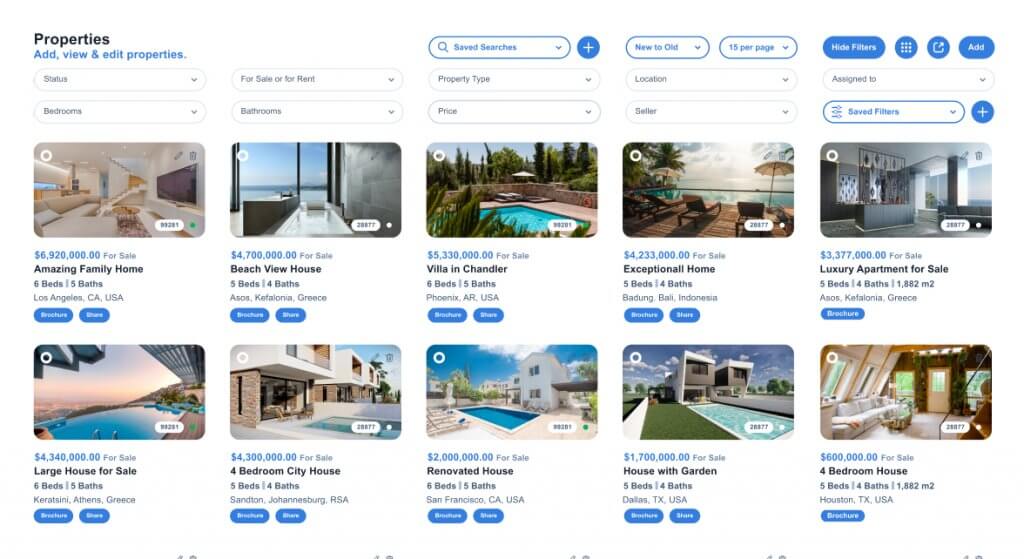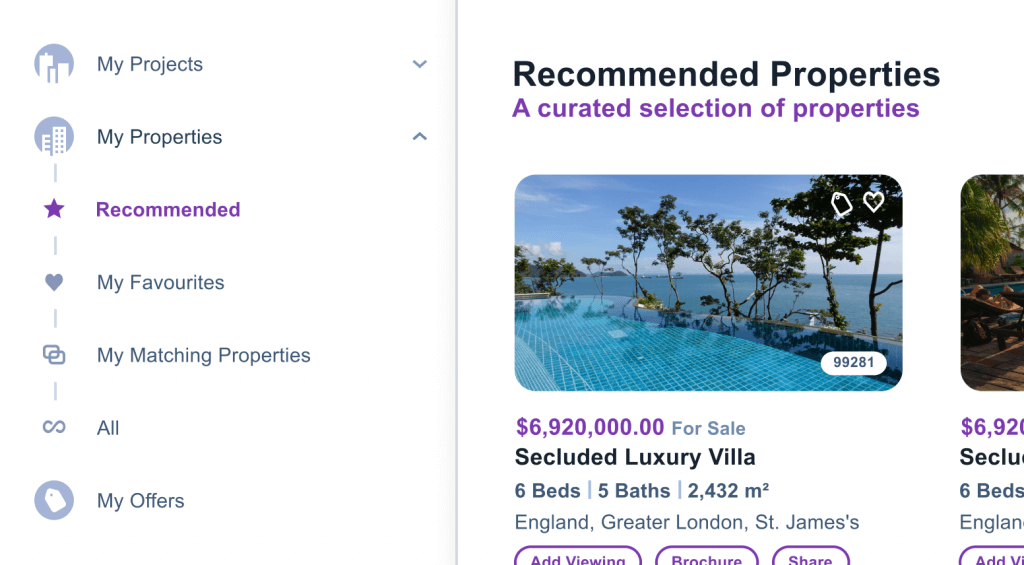There are a number of common myths about real estate CRM that can prevent agents from fully realizing the benefits of this technology. A customer relationship management (CRM) system is a valuable tool for real estate professionals, allowing them to efficiently manage their interactions with clients and prospects. According to Forbes, CRM helps your business maximize customer satisfaction and customer lifetime value, drive more sales, and resolve customer issues faster. In this article, we will debunk some of the common myths about real estate CRM and explain why these systems are worth considering for any real estate professional.
Table of Content
- Real estate CRM systems are too expensive
- Real estate CRM systems are too complex
- Real estate CRM systems are only for large teams
- Real estate CRM systems are only for lead management
- Real estate CRM systems are unnecessary
- Real estate CRM replaces the need for personal relationships with clients
- Conclusion
CRM systems are too expensive
One of the biggest misconceptions about CRM systems is that they are too expensive for the average real estate agent. In fact, there are many affordable options that can provide a wealth of features and benefits without breaking the bank. Some CRM systems are offered on a subscription basis, allowing agents to pay a low monthly fee rather than a large upfront cost. Many CRM providers offer different pricing plans that cater to different team sizes and budgets. In addition, the cost of CRM is often offset by the increased productivity and efficiency that it provides.
Real estate CRM can save time, money, and resources
The myth that real estate customer relationship management (CRM) systems are too expensive is a common misconception. One that is perpetuated by those who have not fully researched the benefits and cost savings of such systems. In reality, real estate CRMs can save time, money, and resources, ultimately leading to increased profitability for real estate professionals.
A real estate CRM system can help streamline and automate many time-consuming tasks, such as data entry and lead management. This can free up valuable time for agents to focus on other aspects of their business, such as closing deals. Additionally, a good CRM can provide agents with valuable insights and data analysis. This helps them make more informed decisions and better understand their target market.
Customizable pricing plans to fit different budgets
In terms of cost savings, a real estate CRM can help agents avoid the expense of purchasing multiple standalone software programs to manage different aspects of their business. Instead, a CRM provides a comprehensive solution that can handle everything from lead management and marketing to transaction management. Additionally, many real estate CRMs offer customizable pricing plans to fit the specific needs and budget of each agent.
Furthermore, a real estate CRM can help agents improve their overall customer service leading to increased customer satisfaction and loyalty. This can translate to repeat business and positive word-of-mouth marketing, which can ultimately lead to more leads and closed deals.
In conclusion, the myth that real estate CRM systems are too expensive is simply not true. In fact, such systems can provide valuable time-saving and cost-saving benefits, ultimately leading to increased profitability for real estate professionals.
CRM systems are too complex
The myth that real estate customer relationship management (CRM) systems are too complex is just that: a myth. CRM systems can be complex, however, many of the newer systems are designed to be user-friendly and intuitive. Although some CRM systems can have a steep learning curve at first, the reality is that these systems are designed to make the lives of real estate professionals easier.
A good CRM is user-friendly and intuitive
First and foremost, a good real estate CRM should be user-friendly and intuitive. It should be easy to navigate and should have clear instructions on how to use its various features. The goal of a real estate CRM is to help agents manage their interactions with clients and potential clients. The system should be designed in a way that makes this process as straightforward as possible.
Support, training and free demos
In addition, many real estate CRMs come with support and training resources that can help users get up to speed quickly. Look for a CRM that gives a free demo before purchase. This can include online tutorials, webinars, and even one-on-one support from the CRM provider. These resources can be incredibly valuable for users who are new to the system.
Tailor made solutions
To keep real estate CRM simple, it should be customizable. This means that users can tailor the system to fit their specific needs and workflow. For example, an agent who specializes in luxury homes may have different needs than an agent who works primarily with first-time home buyers. A good real estate CRM should allow users to create custom fields, tags, and filters. This will help them organize their data and work more efficiently.
It is true that some real estate CRM systems can be complex. However, this is not a blanket statement that applies to all systems. In fact, many real estate CRMs are designed with user-friendliness and simplicity in mind. With the right training and support, real estate professionals can easily learn how to use these systems to streamline their work and better serve their clients.
CRM systems are only for large teams
Perhaps the biggest myth of all is that real estate CRM systems are only for large teams. In fact, small teams and individual agents can effectively use a CRM too. With the right CRM, anyone can track client communication history, property listings, and task management, all in one place. Small teams or even individual agents can use a CRM system to manage their time more efficiently.
In short, the myth that real estate CRM systems are only for large teams is untrue. These systems can be useful for teams of any size. They can help all real estate professionals streamline their operations, improve their productivity, and provide better service to their clients.
CRM systems are only for lead management
While it is true that CRM systems are an effective tool for managing leads, they can also provide many other benefits. It is a myth that real estate customer relationship management (CRM) systems are often associated with lead management. In reality, real estate CRM systems offer a wide range of benefits and features that go far beyond simply managing leads.
Streamline operations
First, real estate CRM systems allow realtors to efficiently manage their contacts, including clients, leads, and other industry professionals. This can include storing important information about each contact, such as contact details, property preferences, and communication history. By keeping this information organized and easily accessible, real estate professionals can save time and stay organized.
Automate marketing
Second, CRM systems often include marketing tools that allow realtors to reach out to their contacts in a personalized way. Some CRM systems offer marketing automation features that can help agents create and send targeted email campaigns to their clients. This can include email templates, drip campaigns, and other automation tools that help real estate professionals stay in touch with their contacts without spending hours on manual outreach.
Provide valuable insights and analytics
Third, real estate CRM systems can provide valuable insights and analytics. This helps realtors better understand their business and make data-driven decisions. This can include metrics on conversion rates, customer lifetime value, and other important metrics that can help real estate professionals improve their business and grow their revenue.
Overall, real estate CRM systems offer a wide range of benefits and features that go far beyond simply managing leads. By providing tools for managing contacts, communication, and data analysis, real estate CRM systems can help real estate professionals grow their business and increase their revenue.
CRM systems are unnecessary
Some real estate agents may believe that CRM systems are not necessary, and that they can manage their client relationships without this technology. While it is certainly possible to manage client relationships without a CRM system, using one can provide numerous benefits. For example, a CRM system can help agents save time and effort by automating repetitive tasks, and can provide valuable insights into their business that can help them make better-informed decisions.
Organize and manage client information in one location
First and foremost, a CRM system allows real estate agents to organize and manage their client information in a single, centralized location. This means that agents can easily access and update client contact information, property preferences, and communication history all in one place. This level of organization is crucial for real estate agents who often juggle multiple clients and properties at once.
Additionally, a CRM system can help real estate agents automate and streamline various aspects of their workflow. Agents can save a significant amount of time, ensuring that important tasks and communications are not overlooked.
Make data-driven decisions with a CRM
Furthermore, a CRM system can provide valuable insights and analytics on an agent’s business. For example, a CRM can track the success rate of different marketing campaigns and the overall engagement of clients with an agent’s brand. This information can help agents make data-driven decisions about their business and identify areas for improvement.
In short, real estate CRM systems are not only necessary, but also essential tools for real estate professionals. They effectively help manage client relationships and grow their business. These systems provide organization, automation, and valuable insights that can help agents succeed in an increasingly competitive market. The myth that real estate CRM systems are unnecessary is just that – a myth.
CRM replaces the need for personal relationships with clients
Some realtors believe that using CRM means they can rely solely on the system to manage their relationships with clients, without the need for personal interaction. This is a dangerous myth, as personal relationships with clients are still a crucial part of the real estate business. While a CRM system can help agents manage their interactions with clients, it should not replace the need for personal communication.
A CRM will never replace the human connection
While a CRM system can certainly help manage and organize a real estate professional’s interactions with clients, it cannot replace the personal touch and individualized attention that are essential to building and maintaining strong, lasting relationships with clients.
A CRM can help a real estate professional keep track of client information, such as contact details and property preferences. It can schedule and manage appointments and tasks. Furthermore, a CRM can help automate some of the more mundane and time-consuming aspects of managing client relationships, such as sending out regular newsletters or following up on leads.
A CRM should enhance customer relationships, not replace them
No matter how advanced a CRM system may be, it cannot replicate the human connection and personal interactions that are necessary for building trust and rapport with clients. Real estate is a people business. Successful realtors know that building and maintaining strong personal relationships with clients is key to their success.
Relying too heavily on a CRM can hinder a real estate professional’s ability to build and maintain relationships with clients. When a real estate professional relies solely on a CRM system to manage their interactions with clients, they risk becoming detached and impersonal. This can ultimately damage their relationships with clients.
Instead of replacing personal relationships, a CRM system should be used as a tool to enhance and support those relationships. It can help real estate professionals stay organized and efficient, freeing up more time for them to focus on building and maintaining personal connections with their clients.
Conclusion
CRM is a valuable tool for real estate agents and brokers, but there are several myths surrounding its use that can prevent agents from fully utilizing its benefits. They are affordable, user-friendly, and provide numerous benefits for real estate professionals of all sizes, not just for large teams and big brokerage firms. No matter how advanced they get, they will never replace the need for personal relationships with clients. By dispelling these myths, agents can better understand the true value of CRM and use it to enhance their business. If you are a real estate agent, contact us to discover how our CRM system can take your real estate business to the next level.




